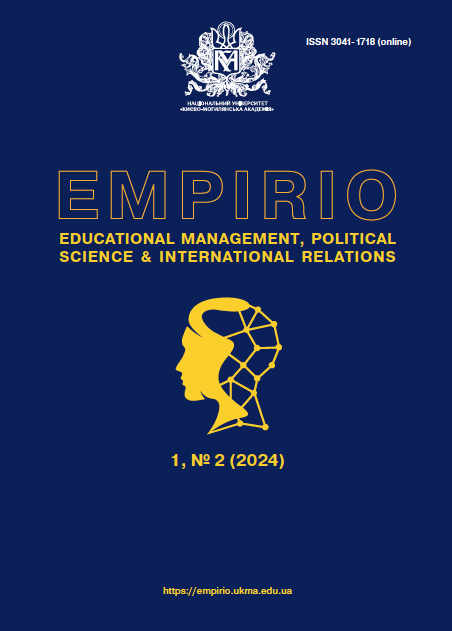Громадянська освіта: міждисциплінарність у становленні категорії
DOI:
https://doi.org/10.18523/3041-1718.2024.1.2.14-24Ключові слова:
громадянська освіта, демократія, громадянин, національна безпека, державна освітня політика, конфлікт держави і суспільстваАнотація
The article examines the historical and contemporary challenges of defining the concept of civic education. Starting from the 18th century, especially in the United States, civic education has been recognized as an important tool for shaping civic consciousness and promoting active citizen participation in democratic processes. Civic education has been pivotal in fostering an informed citizenry capable of contributing to democratic governance and societal well-being. The article emphasizes the renewed relevance of civic education in Ukraine, particularly after the Revolution of Dignity, which catalyzed significant political and social changes. This revolution led to the state’s adoption of the concept of civic education development in 2018, the foundations of which were laid in the new Law of Ukraine “On Education” of 2017. Various definitions of civic education are explored, ranging from broad interpretations encompassing processes that influence people’s beliefs, capabilities, and actions, to narrower ones focused on formal educational programs. The article argues that effective civic education cannot exist outside the context of democracy, highlighting its role in forming citizens capable of participating in political processes, protecting democratic values, and contributing to national security. Different models of democracy and their impact on civic education are also analyzed, proposing a balanced approach where both the state and civil society play important roles. This comprehensive analysis aims to provide detailed recommendations for improving the implementation and impact of civic education policies in Ukraine, ensuring the cultivation of informed, responsible, and active citizens. The study underscores the importance of a conflict and at the same time collaborative effort between state mechanisms and civil society to foster a robust civic education system that aligns with democratic principles and national interests.
Посилання
- Adams, Kimberly. “What federal funding for civics reveals about American political discourse.” November 6, 2019. https://www.marketplace.org/2019/11/06/what-federal-funding-for-civics-reveals-about-americanpolitical-discourse/
- Burroughs, Greer. Democracy: from Theory to Practice. Course Reader. Translated by Iryna Babanina. International Foundation for Electoral Systems, 2019 [in Ukrainian].
- Cabinet of Ministers of Ukraine. On approval of the Concept of civic education development in Ukraine. Order 710. October 3, 2018. https://zakon.rada.gov.ua/laws/show/710-2018-%D1%80#n10 [in Ukrainian].
- Carretero, Mario, Helen Haste, and Angela Bermudez. “Civic Education.” In Handbook of Educational Psychology, edited by Lyn Corno and Eric M. Anderman. 3rd Ed. Chapter 22. London: Routledge, 2016.
- Crittenden, Jack, and Peter Levine. “Civic Education.” In Stanford Encyclopedia of Philosophy, edited by Edward N. Zalta and Uri Nodelman. Fall 2023 Edition. https://plato.stanford.edu/archives/fall2023/entries/civiceducation/
- Dewey, John. Democracy and Education. Mineola, NY: Dover Publications, 2004 [1916].
- Freire, Paulo. Pedagogy of the oppressed. Translated by Oleksandr Demianchuk. Kyiv: Universe, 2003 [in Ukrainian].
- Gutmann, Amy. Democratic Education. Princeton, N.J.: Princeton University Press, 1987.
- Gutmann, Amy, and Dennis Thompson. Why deliberative democracy? Princeton, NJ: Princeton University Press, 2004.
- Mann, Horace. Report No. 12 of the Massachusetts School Board (1848). https://usa.usembassy.de/etexts/democrac/16.htm.
- McCowan, Tristan, and Sonia Gomez. Citizenship Education in Commonwealth Countries. London: Commonwealth Secretariat, 2012. https://doi.org/10.14217/9781848591257-en.
- Nussbaum, Martha. “Education and democratic citizenship: capabilities and quality education.” Journal of Human Development 7(3) (2006): 385–95.
- Powell, Alvin. “How Sputnik changed U.S. education.” Harvard Gazette. October 11, 2007. https://news.harvard.edu/gazette/story/2007/10/how-sputnik-changed-u-s-education/
- Recommendation of the European Parliament and of the Council of 18 December 2006 on key competences for lifelong learning (2006/962/EC). https://eur-lex.europa.eu/LexUriServ/LexUriServ.do?uri=OJ:L:2006:394:0010:0018:en:PDF.
- Robinson, James, and Daron Acemoglu. The Narrow Corridor: States, Societies, and the Fate of Liberty. Kyiv: Nash Format, 2020 [in Ukrainian].
- Ryabov, Serhii. “Hromadianska osvita i yii rol u demokratyzatsii ukrainskoho suspilstva.” In Osvita dlia demokratii. November 11, 1999.
- Ryabov, Serhii. “Civic Education Peculiarities in the Sphere of Political Culture in Transforming Society Developing.” NaUKMA Research Papers 31 (Political Sciences) (2004): 54–64. https://ekmair.ukma.edu.ua/server/api/core/bitstreams/889ace46-7f3b-42bb-9e87-1138d3af4458/content.
- Spaulding, Suzanne E., and Elizabeth Rindskopf Parker. “Reflections on Civics as a National Security Imperative.” May 10, 2023. https://www.americanbar.org/groups/law_national_security/publications/aba-standing-committeeon-law-and-national-security-60-th-anniversary-an-anthology/reflections-on-civics-as-a-national-securityimperative/
- Topalova, Svitlana, and Tetiana Chystilina. “The Future of Civic Education in Ukraine – the Transition to the Relevant European Model.” Center for Political Analysis “Observatory of Democracy”. 2018. https://od.org.ua/en/%d0%b1%d1%83%d0%b4%d1%83%d1%89%d0%b5%d0%b5-%d0%b3%d1%80%d0%b0%d0%b6%d0%b4%d0%b0%d0%bd%d1%81%d0%ba%d0%be%d0%b3%d0%be-%d0%be%d0%b1%d1%80%d0%b0%d0%b7%d0%be%d0%b2%d0%b0%d0%bd%d0%b8%d1%8f-%d0%b2-%d1%83/
- Verkhovna Rada of Ukraine. On Education. Law of Ukraine 2145-VIII. September 5, 2017. https://zakon.rada.gov.ua/laws/show/2145-19#Text [in Ukrainian].
- Winthrop, Rebecca.“The need for civic education in 21st-century schools.” June 4, 2020. https://www.brookings.edu/articles/the-need-for-civic-education-in-21st-century-schools/
- Zhadan, Iryna, Tetiana Klynchenko, Larysa Mytsyk, Oleksandr Narovlianskyi, Larysa Ponomarenko, Oleksandr Rudik, Serhii Riabov, and Iryna Taranenko. “Kontseptsiia hromadianskoi osvity v Ukraini.” Hromadianska osvita 33 (2000). https://osvita.khpg.org/index.php?id=976003974 [in Ukrainian].
##submission.downloads##
Опубліковано
Як цитувати
Номер
Розділ
Ліцензія
Авторське право (c) 2024 Tymur Demchuk

Ця робота ліцензується відповідно до Creative Commons Attribution 4.0 International License.

